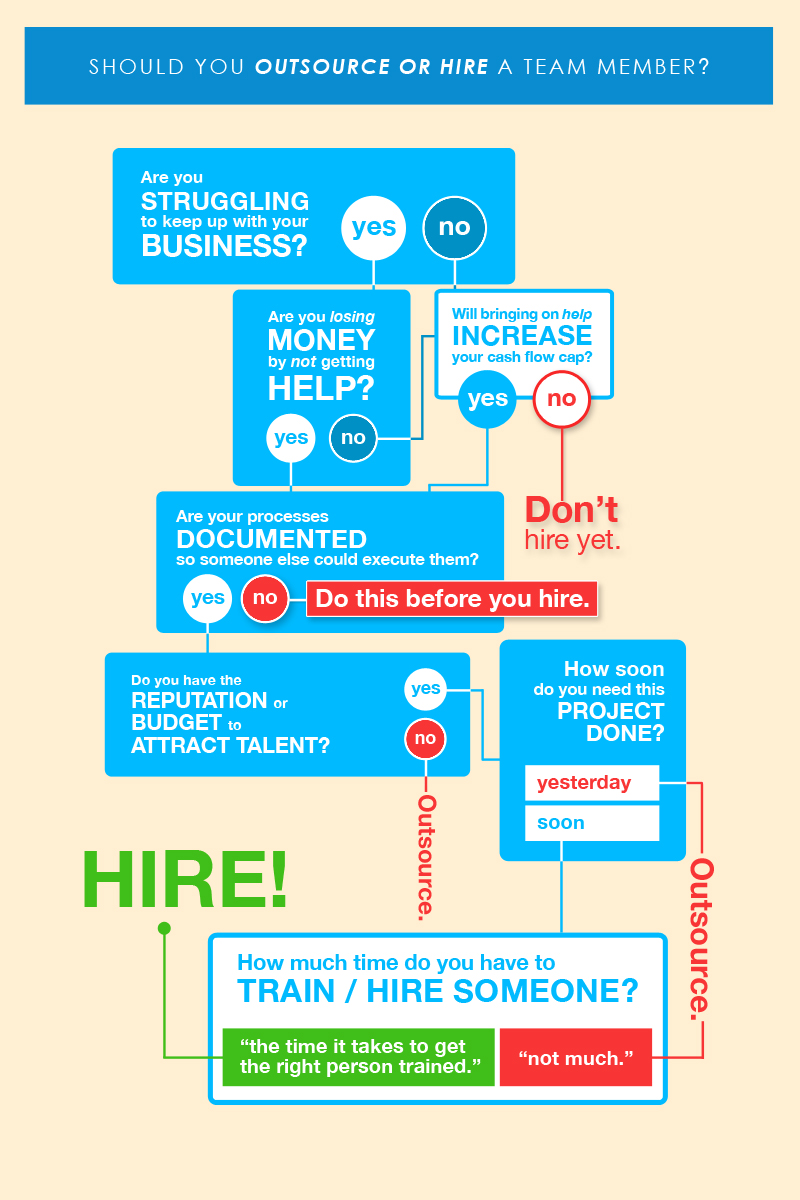
Successful business owners know they can’t do it all (at least not forever) if they want their business to grow. But when do you know it’s time to bring on a team member versus outsource via Fiverr, eLance, oDesk, etc.?
Note: In order to keep this as concise and helpful as possible, I’m going to focus on hiring and outsourcing to remote workers. Hiring offline includes so many other variables, like cost of office space, the inherent limitation of talent based on where you live, legal issues that vary by state and country, and much more. For the average online business owner, legality issues alone in the United States make it much easier to choose hiring a remote employee who gets an 1099 at the end of the year.
First, let’s start with a working definition of hiring vs. outsourcing. In the United States, traditionally hiring someone comes with a lot more red tape than hiring a contractor. For online entrepreneurs, though, the biggest difference between merely outsourcing a task and hiring someone is that idea of bringing on a team member.
It sounds glamorous to grow your team and get extra help. (Don’t lie. You’ve read this article and know you want to outsource arguing with your significant other.) However, when you’re bootstrapping and money is tight, you have to make your outsourcing and hiring decisions count. So how do you figure exactly which choice is right for you?
We’re going to go through the basics of why and what to outsource for the uninitiated, and then dive more into the details of how and when to hire/outsource. (Plus, I made you a sweet infographic to help you make the decision easier and faster.)
So why outsource?
First of all, it’s cheap.
I’m not just referring to the difference in hourly rates for people working overseas, although that is part of it. Chances are you are losing money by not outsourcing. Ex. If you are billing for $50 an hour, and you can outsource the majority of that task to someone who’ll do it for $5 in that same hour, it’s costing you money to not outsource.
Second, outsourcing frees you up to grow your business.
The difference between a small business owner and an entrepreneur is an entrepreneur knows you have to focus on growing your businesses as your first priority. In other words, if you don’t have to do that task, you probably shouldn’t be.
When should you outsource?
This is a hard question because it forces you to look at how you’re spending your time and money very carefully. Hiring is expensive, bootstrapper. Before you bring anyone on, ask yourself:
- Are you prioritizing your time well?
- If yes, are you struggling to keep up with your business?
- If yes, Will bringing someone else increase your cashflow cap?
If taking care of the day to day operations is preventing you from money generating activities, you need to hire help. No task should get in the way of actual moneymaking activities.
That said, it can be confusing to know where to start with the kinds of projects and tasks you can hand off to someone else.
What should you outsource?
1. Jobs that require a skill you don’t have and have no desire to learn
Hate graphic design? Thinking about coding gives you hives? Any skill like web design, content writing, web marketing, or programming that you don’t want to learn can and should be outsourced.
2. Any process that can be replicated by someone else with your instructions
If there are repeatable patterns and processes that have to happen for your business to function, this is a clear signal it’s time to hire some help. Whether it is managing email, scheduling, customer service, file organization, data entry, etc. can be easily and effectively outsourced with clear instructions to any competent VA.
3. Any process/project that directly results in more money generated upon completion
An example would be subcontracting out parts of a project. Just because you’re getting paid to complete a given project doesn’t mean you need to handle all parts of it alone.
Need more specific ideas on what to outsource? Check out this and this. The possibilities are endless.
What else should you know about outsourcing?
Chris Ducker makes a compelling case for hiring for roles instead of tasks here. If your business is at a stage where you need more than just your generalist VA, this is a great idea. Having access to varied skill sets is useful as you move beyond blogging to podcasting, videos, and more.
When should you outsource or hire?
If you’re a baseball fan, this is the difference between your pinch hitter and your designated hitter. Do you just need this thing done now or do you need continued consistency? For the runners out there, do you need a sprinter or a marathon runner?
It comes down to one primary question:
What do you want to accomplish by bringing in outside help?
Do you need to get a finite project done? Or do you need some long-term help from someone who knows your business inside and out?
How soon do you need this project done?
How much time do you have to hire someone? Train someone?
Do you have the budget and/or reputation to attract talent?
This chart will help you decide if it’s time to outsource or hire. (Click to share this.)
Let’s address outsourcing first because, as you can see, most of the time it’s the first choice.
How to outsource like a pro
1. Know your goal
Remember, there is exactly one reason to hire when you’re bootstrapping: to scale your business. Proper scaling requires systemization and documenting your processes so other people can execute them.
2. Have a plan
What roles in your business need filled first? What would free you up the most if someone else could step in and take over a critical process in your business? Offload those tasks first.
3. Find the right person for the job
Easier said than done, right?
Who should you outsource to? How to find the right hire
You’re finally ready to pay someone to help you! This will probably take awhile. Ask around, get recommendations.
Pat Flynn has a great (albeit older) post here on how to hire a great VA, but really, you have so many options at your fingertips! Fiverr, eLance, Zirtual – there are so many options now to find help, it can be overwhelming. Keep at it – and remember, you get what you pay for.
If you’re bringing on a team member, it’s going to be a much more involved process. For instance, anyone who has seen Andrew’s application process knows he isn’t kidding around with cover letters and resumes. The application was involved, took a reasonable amount of time to complete, and made it clear what the position would entail. Additionally, he chose to tap his audience first, not only to see if any readers were qualified and interested but also to spread the word.
Inc lays out a format somewhat similar to this here that focuses more on the internet footprint a prospect has left rather than relying on a resume.
On the other hand, Richard Branson recommends hiring based on personality as well as qualifications. It’s a different process for every business when they begin to seek out talent.
It’s important to note this isn’t necessarily an either/or scenario. You can outsource small tasks out to a VA you don’t know in India, or you can opt for a VA who knows what’s going on in your business and becomes an integral, contracted member of your team.
Business strategy books have switched over in the past 10 years from improving weaknesses to magnifying strengths for a reason. Don’t waste time on something that isn’t in your wheelhouse, especially if you are miserable while you’re doing it.
Recent + Relevant Posts:

The most valuable lesson I learned in 2023
Parts of this are probably going to come out wrong, but I hope you’ll bear with me as I suss this out. I think there’s something important here for more than just me. It’s me! Hi! I’m the problem, it’s me! The most valuable work lesson I learned this year? Not being so trigger-happy on…

a manifesto to improve the personal development space
Hi. I’m Dusti, a Fractional CMO and marketing strategist in the personal development space, and as a long-time service provider, I am an outspoken critic of the false promises, hypocrisy, and theft rampant in this multi-billion-dollar unregulated, and often harm-causing corner of the internet. Despite it all, I think there is good here – and…

With love from Colorado
Sitting at Corinne for brunch with my three beverages – orange juice for morning sickness, water for life, and coffee for my brain – I think I’ve finally adapted to the altitude and caught up on the lack of sleep. I’ve been in Denver since last Friday for The Failure Ball, seeing some of my…

Unexpected news
I’m still reeling from Wednesday. Making good on a campaign promise, Biden’s administration provided student loan relief to millions – including myself. As a recipient of Pell grants, meaning I was very poor when I went to college, $20,000 of my student loans were effectively wiped away with the stroke of a pen. I had…
Filed Under:

Dusti Arab, Fractional CMO
And the founder of the reinvention co, a marketing consultancy specializing in working with personality-driven companies with small teams.
Intense, fun, and relentlessly practical, Dusti understands the lives of small business owners are deeply intertwined with their businesses, and if their marketing is going to be sustainable, it can't get in the way of why they do what they do. (And honestly? It should be fun so they actually want to do it.)
She is the host of Referral Worthy, a podcast for small business owners ready to go from "best kept secret" to the go-to name in their niche.

